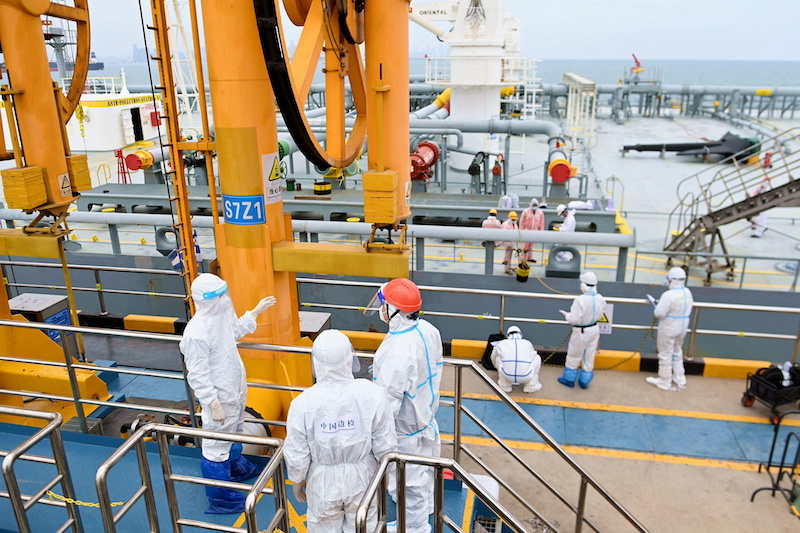China’s independent oil refiners – known as teapots – are facing a tax crackdown and industry consolidation, analysts say.
They could also be affected by international tension over China’s support for Moscow, with European leaders threatening to impose more sanctions on Chinese refineries buying Russian oil.
The European Commission said on Wednesday it was considering listing some independent Chinese refineries in its 19th package of sanctions against Russia over its invasion of Ukraine. Officials said they hoped to propose a new round of bans as soon as Friday after an EU delegation returns from sanctions talks in Washington.
ALSO SEE: Cars From China, Asia Now Face 50% Tariffs, Mexico Says
Beijing imposing a new tax system
But the greater immediate threat appears to be new rules introduced this month to hit profits. A new system aims to target untaxed refined oil, at a time when the sector is struggling with weak fuel demand and overcapacity.
Refiners are required to pay consumption taxes, both when they import feedstock such as fuel oil, and on the refined products they produce, but evasion is widespread.
Industry estimates suggest 30-40% of all gasoline and diesel refined is sold tax-free, according to calculations cited by state oil giant Sinopec and Chinese consulting firm GL Consulting.
New rules implemented by the Ministry of Commerce will scrap paper ledgers and require refiners, petrol stations and other operators to report purchases, sales and inventories online each month. The State Council, China’s cabinet, flagged the changes in February.
Many independent refiners, especially smaller players, rely in part on tax dodges to pad out margins under pressure from falling demand and will be hit hardest, China-based GL Consulting said.
Sector faces ‘destructive competition’
Removing that competitive edge over larger or state-owned refiners that are tax compliant will spur consolidation and dovetail with Beijing’s push to reduce overcapacity, according to Dongyuan Cao, an associate law professor at the University of Science and Technology Beijing.
“The regulation is a vital component of the broader ‘anti-involution’ governance push for a refining sector experiencing ‘low-price competition’,” Cao explained. Involution is a buzzword in China that refers to competition so fierce that it becomes self-destructive.
The goal of the changes is to collect more tax revenue and eliminate illegal petroleum products, Sinopec researcher Qi Mengdi wrote in Petroleum Business News.
The Ministry of Commerce and the State Taxation Administration did not immediately respond to questions.
EVs have hit fuel demand
China has launched campaigns against tax evasion in the teapot hub of Shandong province before, but refiners went back to their bad habits when inspections ended, Sinopec said in a report published in September.
Experts said the new rule will be more effective because it introduces a system, not a one-off campaign.
The stakes are highest for the smallest teapots, which the government has been slowly squeezing for years with higher taxes.
The teapot sector ran at less than half its capacity in the first half of this year as a weak economy and the rapid adoption of electric vehicles hit fuel demand.
Some smaller teapots will start operating at a loss as a result of the change, Li Xiang, a researcher with state oil company CNPC wrote in an article this month.
For refiners, skirting the consumption tax can lift margins on diesel by about 600 yuan ($84.26) per ton (7.45 barrels), said two sales managers, one at a refined product sales company and another at a private refinery. For gasoline, the lift is around 1,900 to 2,000 yuan, they said.
Shandong independent refineries processing imported crude oil earned profit averaging 177 yuan ($24.86) per ton in the first half of 2025, Chinese consultancy JLC estimated.
Reuters with additional input and editing by Jim Pollard
ALSO SEE:
China’s Leaders Keen to End Vicious Price Wars, Curb Deflation
Is China Finally Set to Rein in its Huge Industrial Overcapacity?
Chinese AI Firms, Chipmakers Form Alliance To Ditch Foreign Tech
China’s Xi Issues Rare Warning on Over-Investment in EVs, AI – FT
China’s Criticism of Price Wars Sheds Light on Xi’s ‘Waning’ Power
China’s Intense EV Price War Taking a Toll on Car Dealers
A Deflationary Spiral Looms Over China as Overcapacity Bites
Creative Ideas Needed to Stem China’s Overcapacity: US Official

